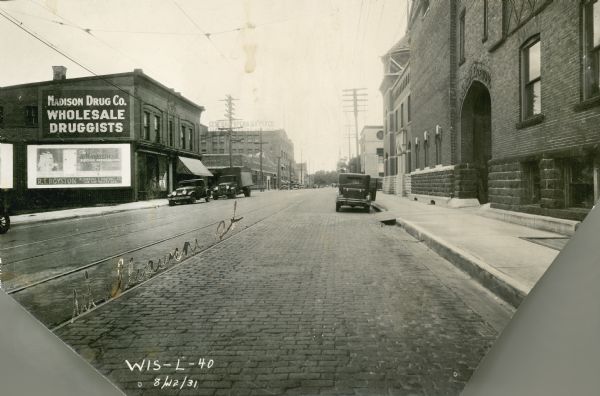
16 Jun The Bakery
The bakery was in the twelve-hundred block of Williamson Street, about the middle of the block and on the north side of the street. It was a two-story building consisting of a pastry shop in front with an apartment above. In the back part of the building, the first floor was dedicated to baking and wrapping about a thousand loaves of bread a day, while the second story was taken up with the production of pastry, fry cakes, raised donuts, cakes, and dinner rolls.
Mrs. Carter ran the pastry shop. She was a clean and fastidious, and Clarence, the second-generation owner, was messy. Mrs. Carter was always cleaning and rearranging the pastry shop, and she forbade the bakery workers from entering with their flour-covered shoes. Mrs. Carter wore a starched white apron and a silly cap and looked just like a pastry lady would look.
(One day, one evening, one morning, etc?), Mrs. Erikson came into the pastry shop demanding to see Clarence. She had a loaf of the bakery’s famous sourdough rye bread in her hand. When Clarence walked in, making a trail with his flour-covered shoes, Mrs. Erikson pointed to a dark spot on the bottom crust of the loaf.
“I’ll sue!” She said, “A fly baked right into my loaf of bread!”
Clarence pulled the dark spot from the bread, popped it in his mouth, and said, “that’s not a fly, that’s a raisin,” thus eating the fly and the evidence against him. He said, “I’ll get you another loaf.” Mrs. Erikson was halfway to Shafer’s drug store before he got back to the shop with her bread. “She’ll be back.” He said to Mrs. Carter who went for her floor mop.
Cedric was in charge of baking the bread and I worked the first part of the shift with him. I cleaned the mixer and other machines while the bread “poofed.” Cedric was a pleasure to work with. None of his efforts were wasted, and he moved like a dancer when he took the bread out of the oven.
Bortollo was an Italian immigrant who was our pastry chef. Bortollo liked me since it was my grandfather’s brother, Judge August Hoppmann, who administered his oath of citizenship. He had a thick Italian accent, and to make it even worse, he stuttered. Somehow whatever he said was clear to me and many times I acted as a translator. Bortollo gave me these three truths of life: ‘All women are beautiful,’ ‘everything that happens to you is your fault,’ and ‘take a nap whenever possible.’ Later on in life I added the forth: ‘a girl can’t have too many cute shoes.’
One day, a baker from Baraboo called and needed some of our sourdough rye starter. His had accidentally been baked or thrown out. The starter, or “sponge” as we called it, was a small set-aside portion of each batch of sourdough bread. The enzymes in it started the next batch of dough. Our sponge was said to be forty years old and the best in the state. Clarence was generous with it but charged a good fee.
Bob, Cedric’s nephew and a member of the bakery crew, was elected to stay until the man from Baraboo came. He wasn’t expected until sometime after midnight. Bob was as clumsy as Cedric was graceful. While cleaning the proofing canvases that night, Bob, standing on two covered fifty-five-gallon drums of lard, edged his feet closer and closer to the inside rims. The lids popped up simultaneously and Bob sunk up to his crotch in lard. Everyone was laughing so hard that they couldn’t help him out and it took Clarence coming from the office to extricate him. Bob’s only work clothes were larded, so he changed into his street clothes and went home. I was then appointed as the keeper of the sponge and given chores to do while I waited for the baker from Baraboo.
Everyone went home and I cleaned the loading dock and swept the driveway. I saw Shirley walking by and called to her. It was eleven o’clock and I thought she might be coming home from babysitting. She explained that her mother was doing business so she couldn’t go home for a while. I got some glazed donuts and two glasses of milk and we sat and talked on the dock.
Shirley told me she wanted to be a nurse and really liked the idea of helping people. The next year she had a job at the hospital. She had received only one letter from her friend, Onion, who had joined the Army the previous winter.
I thought of what Bortollo had told me about all women being beautiful; looking at Shirley, I started to understand. Shirley was as plain as dirt, but her teeth were perfect and her complexion was flawless. Shirley had quiet beauty. I had known Shirley since the third grade, but this was the first time I really talked to her or looked at her for that matter.
The baker from Baraboo came at about twelve-thirty and I gave him his sponge and he gave me an envelope for Clarence. I closed up and walked Shirley home. She stopped across the street from her house and said she couldn’t go in until the front room light came on. We leaned up on a parked car and talked some more. A man came out of the kitchen door of Shirley’s house and headed for his parked car.
A few minutes later, the front room light came on and Shirley said, “I can go in now.” And turned to go.
“Shirley,” I said.
She said, “What?”
The tone of her voice told me that she didn’t need my sympathy, pity, or even understanding.
“Ah nothing. I’ll see you tomorrow,” I said.



Sorry, the comment form is closed at this time.